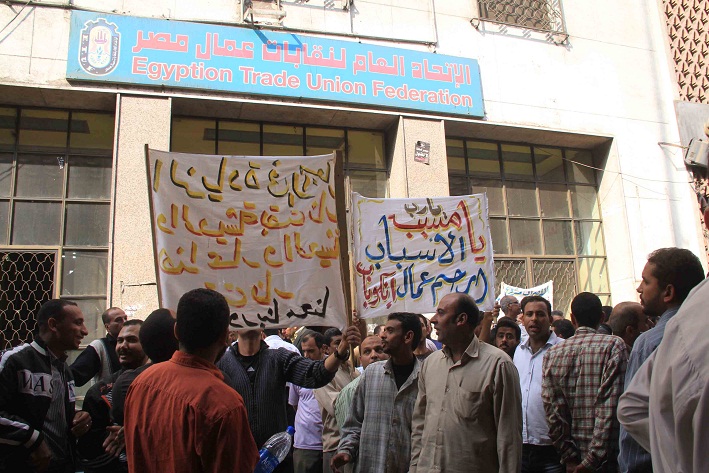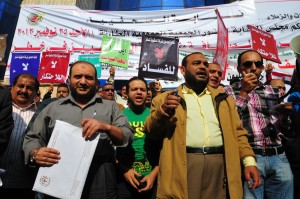
Hassan Ibrahim
When Tahrir Square filled up with protesters demanding the ouster of former President Hosni Mubarak, thousands of workers rushed to the square in support.
“We all went to Tahrir Square, workers from across the country like those from Mahala came all the way to Cairo to participate; we had our signs declaring what sector or company we represented,” says Ali Fatouh.
Fatouh, who for the past 15 years has been a driver with the Public Transport Authority and member of the leftist Tagammu Party, is now head of the Egyptian transport workers independent syndicate. He has been fighting for labour rights since 2002.
Fatouh says that although there was a wide representation of workers from various sectors, the actual numbers were not very high because workers would send groups as representatives rather than have the entire workforce go to the square.
“We would also take shifts, so not everyone participating would do so at the same time. A group of us would go to Tahrir, spend the day, then go home and get changed while another took over the nightshift and joined the sit-in,” he says. “We rotated a lot.”
Two workers from the transport authority died in clashes with police on 28 January 2011, according to Fatouh.
Protesting in the streets was not enough, however, so the workers brought the revolution to their factories, businesses, and garages. They declared a nationwide strike on 8 February 2011, bringing the country to a standstill.
“That is when we realised this revolution was the real deal and started to rally the troops for higher participation.”
On 9 February, the transport authority workers and drivers brought all busses and the 28 garages in Cairo to a grinding halt, says Fatouh. He adds that the move was mimicked across the country in factories and companies everywhere.
“Everyone joined in. Railway workers, metro workers, textile factories in Mahala, everyone.”
Two days later Mubarak resigned, ending his 30-year reign.
Gigi Ibrahim, member of the Revolutionary Socialists, says it was the last two days of the uprising in which workers went on strike that finally forced Mubarak to step down.
“We took to the streets for two weeks and Mubarak held on. You cannot topple the regime by simply asking the dictator to leave. It was essentially the civil disobedience brought about by the nationwide strike that forced him to go,” she says.
“When you hurt power in its pockets, you force it to listen to you. Putting the country on standstill like that forced those in power, the military, to sacrifice the face of the regime, being Mubarak, in order to save the regime itself.”
More than any political reason, labour’s participation in the revolution was a quest for social justice; an eternal quest that in 2006 reignited in the city of Mahala.
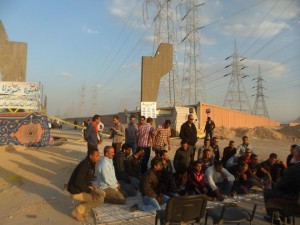
Amr Ghonema
“In 2006 we witnessed a labour uprising; most prominently in Mahala but also in the Delta region in cities like Kafr Al-Dawar,” says Ibrahim.
She says workers were encouraged to rise up after the nascent pro-Palestine protest movement in 2011 and political protests around the 2005 presidential elections where demonstrators chanted against Mubarak.
“The rise of privately owned media also shed light on workers’ issues and their plight. Workers would rarely make the news before that, but then suddenly journalists and television programs started taking an interest,” Ibrahim adds.
“This gave a push to workers and they actually started to strike. They had nothing to lose and they would finally be heard and talked about.”
She also attributes the growing labour movement to Mubarak’s privatisation and neoliberal economic policies, in addition to monopolisation and crony capitalism practices by Mubarak’s closest associates.
“Workers found that if one sector strikes, they were usually able to get some demands met, which created a ripple effect that culminated in the Mahala strikes of 2006,” says Ibrahim.
In December 2006, workers in the textile industry flagship city of Mahala went on strike to demand higher wages. The city repeated the strike two years later in protest of rising food prices, and citizens clashed with riot police on a scale that had never been seen in during Mubarak’s era.
“In February 2008 we finally saw for the first time mass labour mobilisation,” Ibrahim says. “The strike scheduled for April never actually took place as the riot police went in, beating the workers, and the whole town erupted in what basically was a revolution, and a glimpse of what was to come in 2011.”
Although they were unorganised and had little coordination, instances of labour strikes increased after that, says Ibrahim, because the government failed to offer any form of concession or reform.
It was Mahala that inspired the quest for labour rights that lay dormant throughout Mubarak’s reign. Two years after his ouster, this quest is yet to produce results in the eyes of many.
More than any political reason, labourers’ participation in the revolution was a quest for social justice; an eternal quest that in 2006 reignited in the city of Mahala and, two years after Mubarak’s ouster, is yet to produce results in eyes of many.
“After Mubarak stepped down, we did not immediately disband our sit-ins and strike. Egyptian workers as a whole had a major demand: an increase in minimum wage and the introduction of a maximum wage cap in government institutions,” said Fatouh.
He added that workers continued to strike ten days after Mubarak’s ouster until workers were given some pay raises by the ruling Supreme Council of the Armed Forces (SCAF).
“The Egyptian street was also tired by then; people wanted stability and we still trusted the [SCAF] at the time.”
In 2010 lawyer Khaled Ali filed a case with the Administrative Court demanding a higher minimum wage. The government’s Supreme Council of Wages had not met since 1984, leaving the official minimum wage at EGP 36 per month.
The Egyptian Centre for Economic and Social Rights, which Ali chairs, had released a report arguing that the suitable minimum wage was EGP 1,200 per month, in accordance to cost of living estimates at the time.
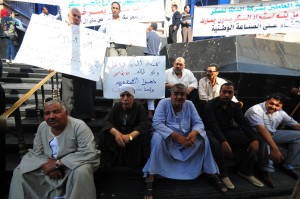
Hassan Ibrahim
The court ruled in Ali’s favour and ordered the government to implement a fairer minimum wage. The government, acting on the advice of business associations, instead set a minimum wage of EGP 400.
Following Mubarak’s ouster labourers, like most segments of society, felt their demands would be met soon, or that the government would at least pursue them.
Indeed, Ahmed El-Borai, current deputy leader of the opposition Al-Dostour Party was picked as labour minister in former Prime Minister Essam Sharaf’s interim cabinet.
While Al-Dostour was not yet formed at that time, El-Borai was, and still is, a known social democrat and advocate of labour rights.
He immediately drafted a new labour law that lifted the minimum wage up to EGP 700, citing the poor economy and depleted state budget as the reason the government could not provide EGP 1,200.
However, that same economic state had contributed to an increase in cost of living, and by that time workers and labour activists had started demanding a minimum wage of EGP 1,500.
Furthermore, in regards to the public sector, only government employees benefited from the increase. Workers and temporary labourers at public sector companies and factories found that it did not apply to them.
While the law also allowed workers to form independent unions and syndicates at will, thus bypassing the decades-old Egyptian Trade Union Federation (ETUF) that was the only legal form of unionisation under Mubarak and doubled up as his party’s labour arm, the ETUF survived Mubarak.
“Even before El-Borai drafted the [labour] law, we had decided that we needed different tactics to deal with employers and the government and already started forming independent unions and syndicates since February,” says Fatouh.
Workers saw intense competition between “official” state-sanctioned syndicates and new independent ones over their membership, but many employers preferred to continue to deal with the ETUF syndicates, viewed by most workers as corrupt, for several reasons.
El-Borai’s law, for example, did not limit independent syndicates at any given company or factory to a certain number, meaning one company or factory could find its labour force spread amongst four or five syndicates.
Not surprisingly, there are employers who find the subservient state “official” unions as a much-preferred negotiating partner on labour issues.
The law only gave workers the right to form syndicates but did not regulate any new ways in which they could negotiate with employers, and thus strikes would either fail to produce results or escalate dangerously.
The transitional period after Mubarak’s ouster saw a wave of labour movements and strikes that the government labelled as “factional demands”. State rhetoric started out with these demands being “legitimate” and it simply “not being the time” to address them since the country was in crisis. Eventually, the government’s tone changed, labelling such movements as selfish and calling on citizens to “put their country first”.
Still, workers also participated in larger revolutionary movements such as the November 2011 protests and subsequent clashes with police in Mohamed Mahmoud Street.
Protesters were demanding that the ruling military council hand over power to a civilian government. Fatouh stresses that although many workers participated, it was a personal decision made outside of syndicates and unions, however.
“Many of us were there, demanding that the SCAF go, and some of us were injured in these clashes. We wanted the SCAF to go because the military proved it was incapable of running the country at the time,” says Fatouh.
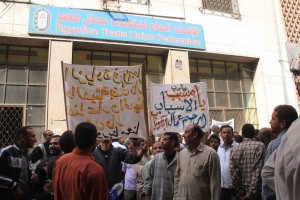
Islamist groups and parties at the time boycotted the protests, believing them to be aimed at postponing parliamentary elections, derailing the democratic transition.
Fatouh vehemently denies that the political affiliations of workers interfered in their solidarity with fellow workers.
“We insured that no-one was able to politically direct workers. I am a member of a leftist party but I have never asked or campaigned on workers to join my party. We had Salafis among our ranks, for example, who still participated in all our strikes and protests,” he adds.
“Religious and political affiliations have nothing to do with labour demands and we keep them completely separate. Our Salafi colleagues also participated with us in the sit-in by the cabinet building that December when we demanded the SCAF leave despite Salafi political parties being on the military’s side.”
Many might consider protests calling for the end of military rule are political in nature. Not according to Fattouh.
“We demanded the military council hand over power because it proved its failure in addressing the economic demands of Egypt’s workers and sometimes actively fighting them.”
Fatouh recalls a personal example. When transport authority drivers and workers decided to close down the garages a second time, the military did not address their demands and instead sent in military busses with conscript drivers to replace the driver and buss shortages that resulted from the strike.
“We let them work and did not interfere with what they were doing. They sent 50 busses, 37 of them came back smashed at the end of the night. The public could not handle military drivers and conductors; they invariably clashed.”
The example shows how the military council ignored the demands of labour, says Fatouh. “At least Mubarak’s government told us they would look into it then do nothing. SCAF just pretended we did not exist.”
Naturally, this affected morale. And when activists called for a civil disobedience against the ruling military council in February 2012, most workers ignored the call, preferring to wait until a new president was elected.
Following the election of Muslim Brotherhood candidate Mohamed Morsi, Egypt saw for the first time ever protests in front of the presidential palace, when hundreds of workers from different labour sectors and industries staged demonstrations demanding more labour rights and a higher minimum wage.
Although these protests were nonviolent, they were largely ignored. Morsi and the Brotherhood have made clear that the economic plans fall in line with neoliberal policies, as evidenced by applying for a loan with the International Monetary Fund and the resulting scaling back of subsidies.
Still, Fatouh says, most workers kept their faith in Morsi; that is, until he started to push his new constitution into adoption.
“We opposed this constitution on two grounds. First, it did not provide adequate labour rights when it came to unionising; this was later amended, however. It also tied minimum wage to productivity and not prices.”
Still, he is hopeful this issue will be resolved in subsequent legislation. “Most of Egypt’s workers are employed in the service sector. How are we to measure their productivity? What if a factory is not doing well, should its workers’ wages be reduced?”
Overall, Fatouh feels that when it comes to economic policy, there is no difference between Mubarak, the military or Morsi.
“We get the same promises and nothing happens on the ground. Unemployment is rising, strikes are still on-going, and many workers have their demands unmet to this day,” he says.
“If the situation remains the same and there is no swift intervention when it comes to labour rights and wages then Egypt will be on the brink of a real disaster.”
